
Build web applications in Python with the guidance of industry programmers
Put yourself in the shoes of experienced programmers and get a true insight into the industry
Dedicated Students Only
Unlimited hours of Experience
100% outcome-based
Cohort experience certificate

Grow Your Experience from today
Start learning now at ₹0 upfront fee.
The roles and responsibilities of a Python Developer
Identifying the application requirements in collaboration with the development team
Developing back-end functionality in Python with scalability in mind
Debugging and testing applications
Learn It Do It plan to make you a job ready Python Developer
What will you learn in this cohort? Let s have a closer look

Level 1 : Web Application Python Programming Stack
It consists of :
In-depth look at the following basic topics of python development and their creative applications
Hands-on application-1. Programming Language
-
Getting to know how to set up your development environment.
-
Exposure to use Open Source Libraries.
-
Library Development using Python.
Hands-on application-2. Web Application
-
Website building using the Django framework.
-
Simplify client/server communication using Rest API.
-
Use of Templates.
-
Front-End Development.
Hands-on application-3. Backend
-
Database management using PostgreSQL.
-
Database manipulation using SQLite.
Hands-on application-4. Application Deployment
-
Deploy and scale python apps using Heroku.
-
Use of development server PythonAnywhere.

Level 2 : Data Science Using Python Programming Language
It consists of :
In-depth look at the following basic topics of python development and their creative applications
Hands-on application- 1. Programming Language
-
Getting to know how to set up your development environment.
-
Exposure to use Open Source Libraries.
-
Library Development using Python.
Hands-on application-2. Backend
-
Database management using PostgreSQL.
-
Database manipulation using SQLite.
Hands-on application-3. Data Science
-
NumPy assignments involving arrays.
-
Data analysis using Pandas.
-
Visualizing data with Matplotlib.

Level 3 : Machine Learning Using Python Programming Language
It consists of :
In-depth look at the following basic topics of python development and their creative applications
Hands-on application-1. Programming Language
-
Getting to know how to set up your development environment.
-
Exposure to use Open Source Libraries.
-
Library Development using Python.
Hands-on application-2. Machine Learning
-
Handling Text-Data.
-
Learning Machine Learning techniques.
-
NumPy, Pandas Library.
-
Create software applications using ML Library.
-
Use of SciPy Library for scientific and technical computing.
-
Use of SciKit for statistical modeling.
-
Use of SciKit for statistical modeling.
You can also create real-world projects like this
Cohort projects created by students

Socius Member Directory Application
Socius is an all-in-one membership management platform. The platform allows members to share news and updates with other members. Member also can have their profile update to foster any business collaborations. Features are build keeping in mind member engagement and participation.
Development Platform-
-
Python 3.x
-
Django 3.x
-
Bootstrap 4.x
-
PostgreSQL 12.x

Email Design and Delivery (EDD)
EDD helps Small Businesses and Independent Consultants create, send bulk emails to existing and prospective customers quickly and easily. Building meaningful relationships with customers is easier with this application. Additionally, the Application generates analytical reports that help users increase the effectiveness of their marketing campaigns.
Development Platform-
-
Python 3.x
-
Django 3.x
-
Bootstrap 4.x
-
PostgreSQL 12.x
Who is this cohort for?
Check if this cohort matches your interest
Any student with a (10+2) or bachelor s degree seeking a career in Web & Software Development can apply.
Junior developers who want to keep up with industry standards and brush up on their skills.
Data Science & Machine Learning professionals who want to take advantage of data analytics to grow in their career.
Software Developers and Data Analysts looking to make the transition to Software Development industry.
Career opportunities in Python Development
Explore upmarket career opportunities in Python Development after completing the cohort
Python can be used in a range of fields, including testing, web development, app development and upgrades, and writing scripts, to name a few. The average salary of a Python developer is around 5,80,000 per year. With the right experience and additional skills, this figure may go well beyond Rs 1,000,000 per year.
Upon successful completion of the cohort, you will be prepared for a variety of roles, such as Web Developer, Software Engineer, Data Scientist and Machine Learning Engineer.
More than 5000 companies are recruiting for Python Developer positions.

Gaining confidence through practical assignments that are market-relevant & latest technology-driven
Getting hands-on training, guidance & feedback from the real industry PROs
Improved communication skills & work ethic by working in a team
Networking & career opportunities in the community
Regularly conducted free webinars to address all career-related issues
Not able to set up the Integrated Development Environment (IDE)
Confused about how to structure the code
Lack of understanding of compiler errors
Unable to debug the code to refine errors
Unaware of different Python frameworks and libraries

Join LIDI and become the industry efficient python developer you were meant to be
Experience the ins and outs of the industry in real-time
Method that is relevant to industry
Data-driven approaches to solving real-time business problems
Mentorship and guidance
Full support in the execution of projects from start to finish by industry leaders & subject matter experts
Hands on commercial experience
Practice writing different types of content and using online tools to streamline your workflow
Chances to network
Join a growing community of budding but talented peers led by alumni and experts and become a team player
Our cohort is based on four fundamental principles
What makes this cohort different? Find out yourself